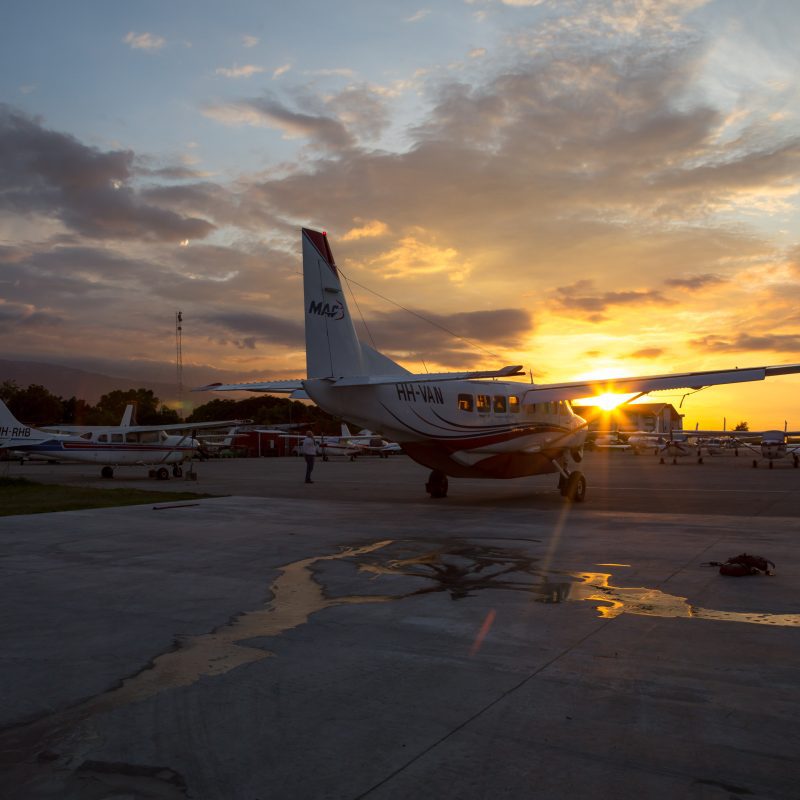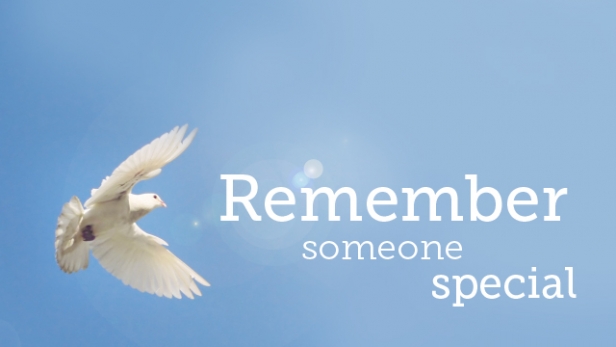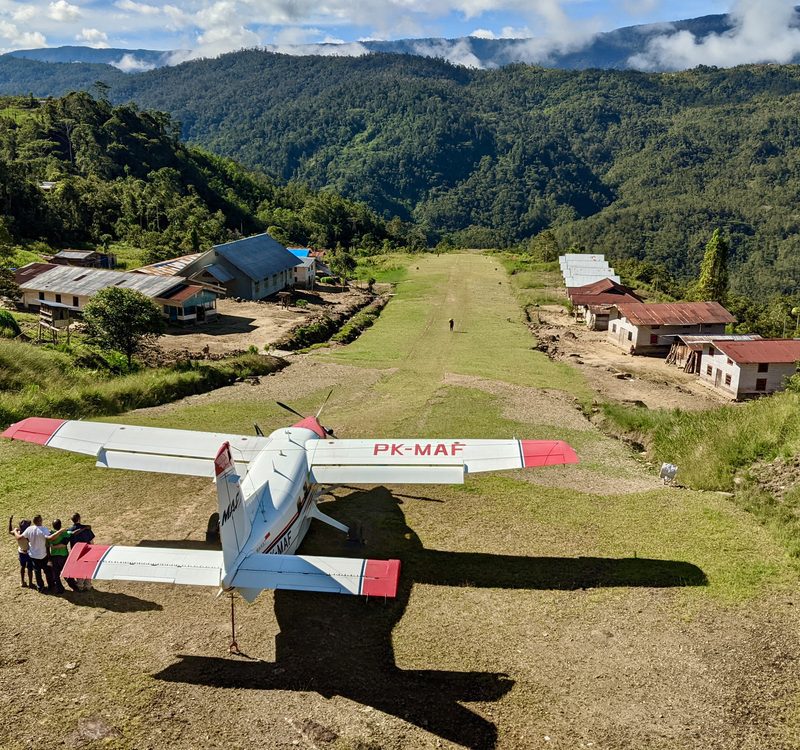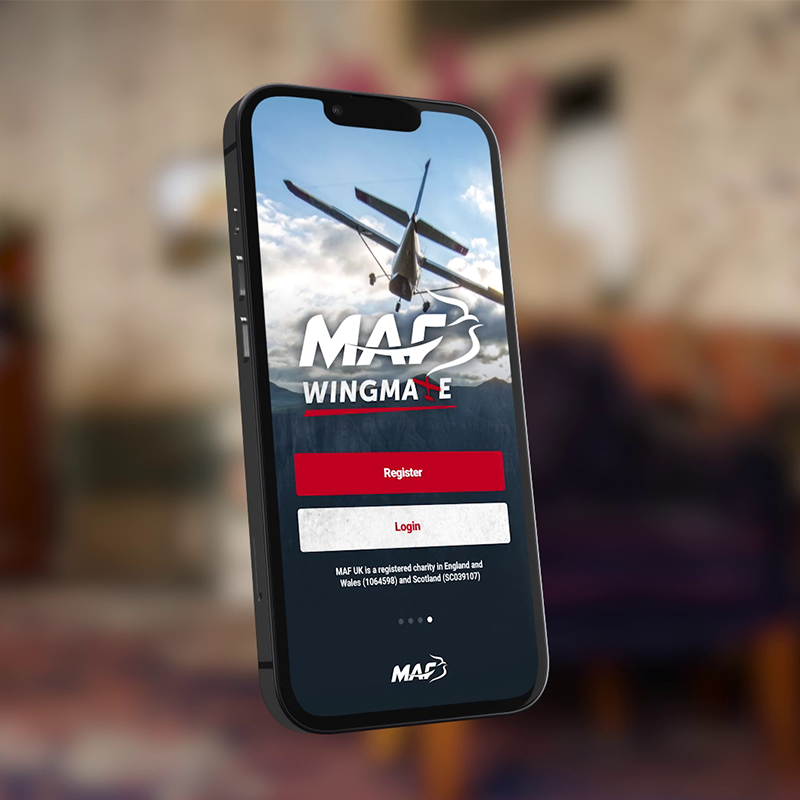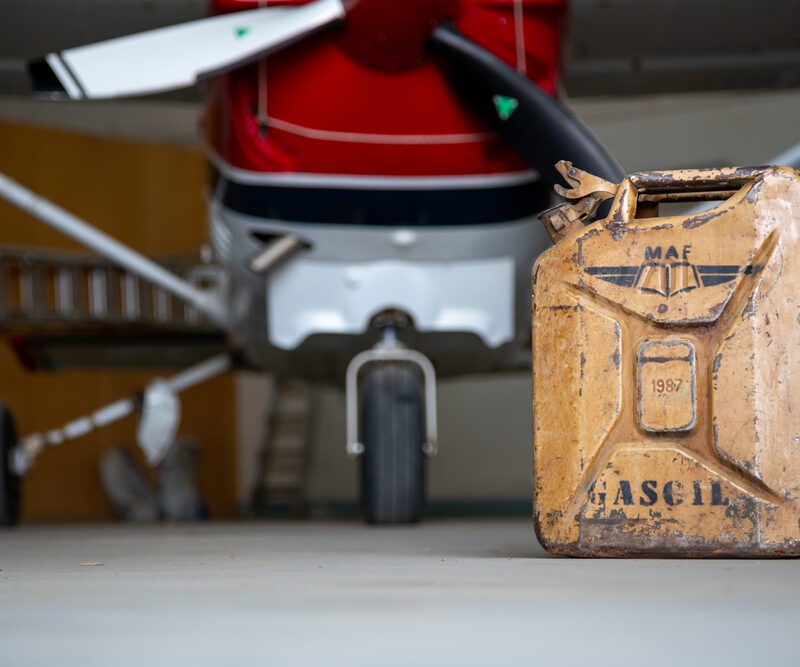He Saw It Was Good Bible Study – Find Out More

On this page, we have lots of other examples of how MAF helps to advance the Sustainable Development Agenda through our work and ministry, and through partnership with other organisations seeking to reach the most isolated communities on earth. Click on the links below to jump to the course session you wish to hear more about.
Session 1 – Our Global Home
Session 2 – Loving God’s Way
Session 3 – Thriving in God’s World
Session 4 – From Seed to Sapling
Session 5 – Building Bridges
Session 6 – Stronger Together
Session 1 – Our Global Home
Over the last 76 years, MAF has been helping missionaries reach communities and people groups that are so isolated, that they are completely cut off from the world around them. It is not only physical help that MAF flies, but also spiritual help.
In today’s world, isolation is one of the main barriers i to evangelism and telling people about the love of God. MAF works in partnership with many other mission agencies and organisations that specialise in Bible translation, to bring the word of God to people who have never heard it before.
As Christians, we believe that it is not only physical poverty that needs to be tackled, but also spiritual poverty, so as we talk about the sustainability of our planet, that also includes our responsibility as followers of Jesus to make disciples of all nations.
In Papua, Indonesia, the Moi people were completely unreached by the outside world, and they weren’t aware that they were actually part of the country of Indonesia. They didn’t have money, they didn’t have clothes and they couldn’t speak Indonesian.
The scale and remoteness of the isolated people groups in Papua is overwhelming. For instance, in the northwest of Papua, a road journey between Daboto and Nabire, a distance of around 75 miles takes in the region of three weeks such are the vagaries of travel, not by road but by cutting your way through jungle and overcoming swamps and mountains. With MAF, this journey is transformed into a 30-minute flight. This is the kind of connectedness that we enable and why so many missions, and villagers alike, have a dependence on MAF in this part of the world.
With the help of MAF, Stephen and Carolyn Crocket have been in Daboto, Papua, carrying out Bible translation work for the Moi tribe since 2000. They have an incredible ministry and an even more incredible story…
Session 2 – Loving God’s Way
One of the most significant ways in which MAF can create connectedness between people in remote areas is by providing access to healthcare in places where it is scarce, or simply doesn’t exist.
An example of this is in Chad in northern Africa where MAF has been supporting medical outreaches for over 50 years. Flights bring doctors from the capital to remote villages which have no access to healthcare.
In this video, hear from Dr James Appel, pharmacist Claire Bedford, Dr Ali Waidou and MAF pilot Johan Brugmans as they tell of how through MAF flights, healthcare provision is being developed throughout the country.
Session 3 – Thriving in God’s World
When the COP26 UN Climate Change summit took place in Glasgow in 2021, MAF highlighted some stories of how MAF’s work, alongside our partners, is seeking to address the climate-related threats in the remote communicates in which we serve. Here are some of those stories:
TANZANIA:
World leaders have promised to end deforestation by 2030. Trees absorb carbon dioxide emissions – a major contributing factor to global warming – but, according to MAF partner Justdiggit, nearly 3 million hectares of African forests are lost every year and 65% of the continent is suffering from land degradation.
The organisation, whose mission is ‘to regreen Africa and cool down the planet’ has been helping farmers in Pembamoto, Tanzania restore vegetation via ‘bunds’ – semi-circular pits, which capture rainwater, infiltrate the land and make it fertile again. MAF passenger, Tabby Njung’e from Justdiggit, says:
‘MAF was very useful in safely getting us from Dodoma to Arusha in time. As we only had a few days to carry out our visits, road transport would not have been an efficient option.’

Before and after in Pembamoto, Tanzania – Photo by Justdiggit
UGANDA:
Karamoja, in north-east Uganda, is one of the country’s regions most vulnerable to climate change. According to the UN, droughts in Karamoja frequently affect crop production and pasture for cattle. This in turn impacts food security, livelihoods and the health of this remote, rural population. Malnutrition and stunted growth are rife.
Mohamed Sati, Head of the World Food Programme in Karamoja, regularly uses MAF to monitor projects, which empower local farmers to produce more food, and to oversee school feeding programmes:
‘We feed 130,000 children every day in 290 schools in the 7 districts of Karamoja. By road, it can take 10 to12 hours to reach my head office in Kampala, but MAF makes it very easy for us – 2 hours max. In terms of time management and cost effectiveness, it’s better to use MAF. It makes life easier to work in this very remote region.’

Aerial photos of various typical Karamojang villages in Eastern Uganda – Photo by Dave Forney
SOUTH SUDAN:
Destruction of trees from fire, acquiring firewood and farming causes reduced infiltration (when soil absorbs water), erosion and siltation (when rivers become polluted and turn into silt).
This has contributed to intense flooding in South Sudan in recent years, affecting over 700,000 people (source: inews). Usable water for people and livestock is shrinking.
MAF partner NIRAS has set up the ‘Water for Eastern Equatoria Project’ in Torit and Kapoeta – a sustainable water scheme to conserve enough water for everyone. Ole Stokholm Jepsen says he wouldn’t be able to do his work without MAF:
‘We often travel between Torit and Kapoeta to supervise our projects. By road it would take 3 to 4 hours and the risk of ambush on that road is too high. MAF is the only airline that regularly flies between these towns.’

NIRAS Handpump – Healthcare Centre at Himondonge, South Sudan – Photo by Thorkild Jørgensen
CHAD:
Lake Chad used to be one of Africa’s largest freshwater bodies, but today it’s shrunk by 90% due to mismanagement and climate change. Temperatures in this region are rising 1.5 times faster than the global average (source: Concern Worldwide). Out of the 30 million people who rely on this water, one third need humanitarian assistance.
MAF passenger Ben* from The Evangelical Alliance Mission (TEAM) helps communities drill boreholes and install pumps so that they can access clean water. Ben says environmental matters and our relationship with God are inextricably linked:
‘What strikes me here is the lack of care for the environment. We see it all around us, but we depend on creation for our survival. We teach creation where God created the world, and everything was perfect. Today’s world isn’t perfect because of sin. God’s water was perfect, but once you add man to the equation, we ruin it. Our training helps communities manage the water God gives them and how to keep it clean. It’s a good springboard for discussing creation care and the Good News.’

Creation care flight for TEAM in Eastern Chad – Photo by Katie Machell
Session 4 – From Seed to Sapling
As was noted in the devotion in this study, it worth stating that Jesus did not say that man does not need bread to live, He simply said that there are other facets to our being that require sustenance.
Regardless of our condition, geographical location, or financial status, to truly prosper we require physical, psychological and spiritual nourishment.
1 Thessalonians 5:23 clearly reveals that man is a tripartite being. We are more than flesh and blood. In fact, the scripture orders our spirit and soul over that of our body or physical being.
It is this spiritual nourishment that MAF helps to bring to the Maasai people of northern Tanzania through the regular Malambo Evangelism Safari. With MAF’s help, Evangelist Elisha has been able to take the Gospel to the Maasai people and has witnessed many turning to Jesus over the years.
Through this work, the Malambo Bible and Discipleship School has been developed, to teach the next generation of evangelists and Bible scholars. By providing the connectedness that is so needed in these remote areas, MAF is playing a vital part in growing the prosperity of the Maasai people through the spiritual nourishment found in the preaching and teaching of the Word of God
Session 5 – Building Bridges
Democratic Republic of the Congo (DRC):
In the village of Nyankunde in the DRC, MAF operates one of its most remote bases.
Eastern Congo has long been in a state of civil war and millions of people are internally displaced and many have fled the country. Militia groups have chosen the remote countryside and villages like Nyankunde as their battlefields.
On 5 September 2002, a tribal conflict backed by local militias erupted there. The village and hospital were invaded, with doctors and nurses and patients in their beds being killed as well as patients. An estimated 3,000 civilians were killed in the massacre.
MAF evacuated as many people as possible, but the remaining villagers were forced to flee into the forest. Survivors walked for days through the jungle and lived in refugee camps for years, hoping someday to return to their village. Most of buildings including the hospital were looted and completely destroyed.
Flights resumed two years later, from a neighbouring city, providing a lifeline for the people working tirelessly to bring the community back to life.
It took ten more years for the situation to stabilise enough for the families of MAF to rebuild their homes and move back. Today, Nyankunde’s hospital has been rebuilt and treats members of all the tribes from the surrounding area, including those involved in the massacre.
The hospital has been a place of reconciliation between the tribes, assisted by the local radio station, proclaiming the Gospel and the message of reconciliation throughout the whole area – an area once ravaged by conflict, now has been brought together with a message of hope.
SOUTH SUDAN:
In South Sudan’s tenth year of independence, MAF continues to run peace and reconciliation workshops all over the country. Since 2018, 18 workshops have transformed lives, replacing hate with hope.
South Sudan’s civil war (2013-2018) saw 400,000 people lose their life, and triggered Africa’s largest refugee crisis since the 1994 Rwandan genocide (source: Reuters).
Although a peace deal was signed in 2018 – and again in 2020 – violence continues to mar the country.
According to Oxfam, nearly four million people have fled their homes with two million of them now living in neighbouring countries. Fear, despair and mistrust have plagued the people of South Sudan for many years, but church leaders continue to hope, pray and work towards a better future.
In 2021, MAF facilitated ten workshops across the country. In June 2021, Bishop Emmanuel gathered people from his diocese in Kajo Keji to participate. The workshops teach that reconciliation starts and ends with God; a change of heart is required.
Bishop Emmanuel is enthusiastic about his partnership with MAF:
‘I thank God for our relationship with MAF. Your service to our people helps us a lot, especially when people are sick and you fly them to Juba…It’s also very important to build peace, bring people together, and build confidence between people who mistrust each other, so that eventually they can live like brothers.’
Read the full story here.
Session 6 – Stronger Together
Hundreds of Liberian healthcare workers — 10% of the entire country’s workforce — lost their lives treating patients during the 2014 Ebola outbreak. This has led to Liberia having some of the poorest health outcomes in the world.
Missionary organisation SIM lost 12 physicians, about 170 nurses and other healthcare providers. One of their missionaries, Dr Rick Sacra, contracted the deadly disease while performing an operation to deliver a baby. Thankfully he survived and now, with help from MAF, has been able to set up a family medicine programme to train more doctors and re-equip the country’s fragile healthcare system.
MAF also partners with Partners In Health (PIH) in Liberia. Cate Oswald who works with PIH said,
‘It’s going to be a good 10-15 years before we actually have enough doctors trained. The opportunity to have MAF on a weekly basis has been an incredible partnership.’
It is only through working in close partnership that MAF are able to enable many other organisations fulfil their work and mission. Without us, they would not be able to work in remote locations and would not be reaching the isolated people most in need.




































